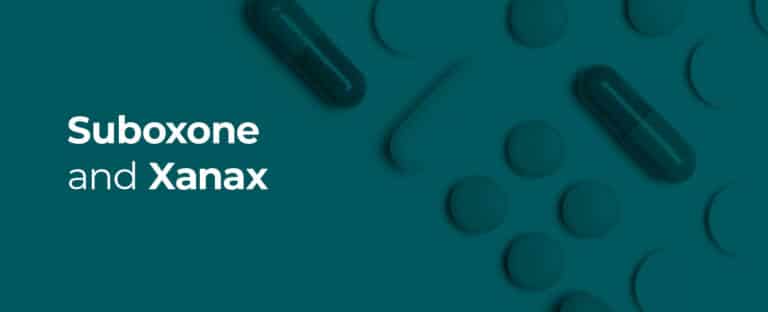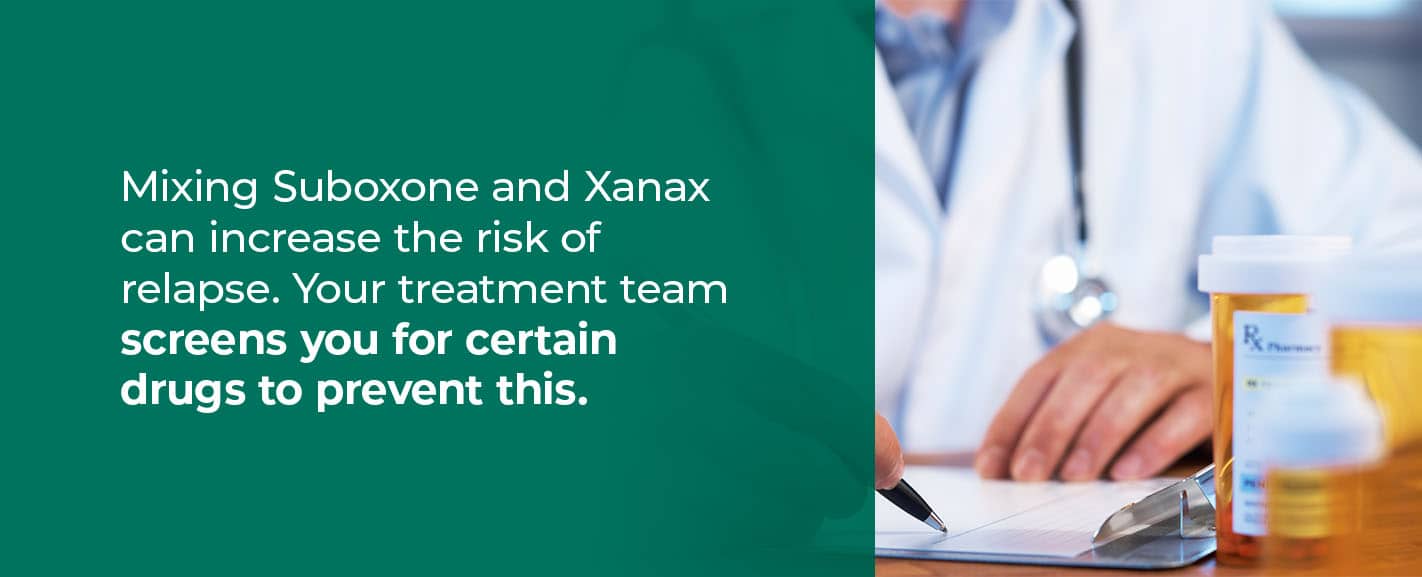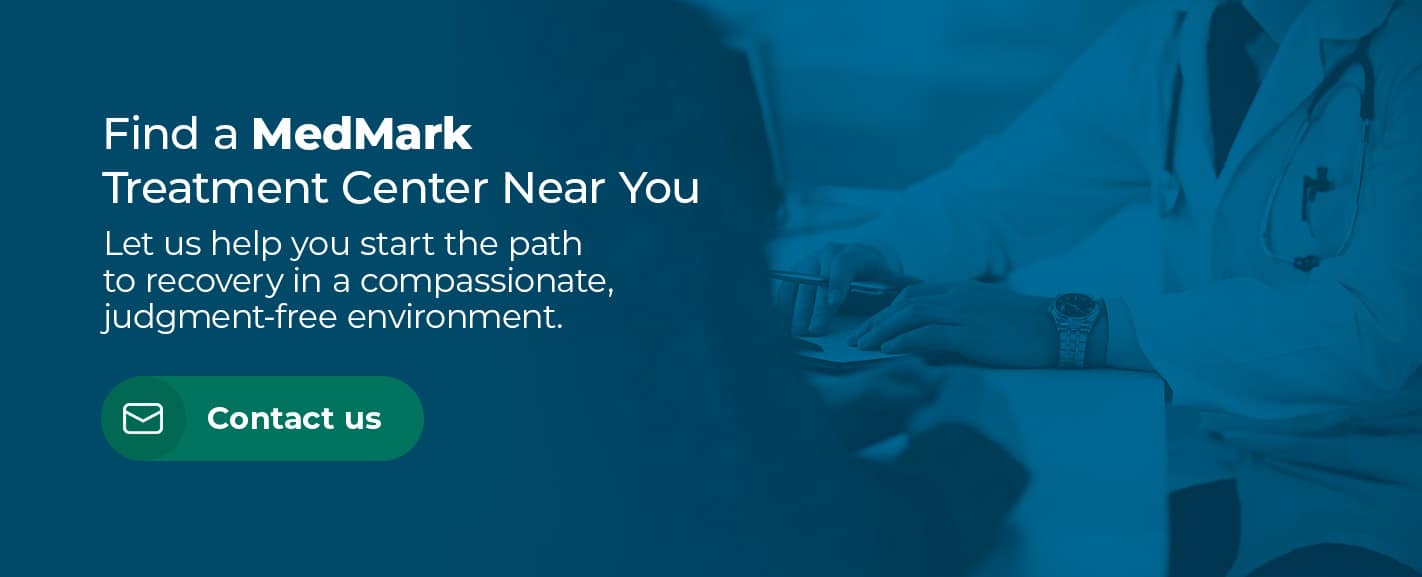Some patients who take Suboxone® as part of medication-assisted treatment (MAT) also take Xanax. They may have prescriptions for both drugs from separate doctors. Patients who are undergoing medication–assisted treatment (MAT) and are prescribed Xanax may try to use it to enhance the effects of opioids. However, it is important to understand that combining Suboxone and Xanax carries significant risks and should be avoided. In this blog post, we will explain why individuals taking both Suboxone and Xanax should consider adjusting their treatment plan.
What Is Suboxone?
Suboxone is a medication used in MAT that reduces withdrawal symptoms and cravings. It helps patients by activating the opioid receptors without causing euphoria. Minimizing the effects of withdrawal and removing a positive association with opiates makes it easier to commit to treatment. The naloxone in Suboxone also deters injection. Buprenorphine, an opioid that is safe for recovery under supervision, satisfies the brain’s need for opioids without a “high.” Suboxone combines the benefits of naloxone and buprenorphine because it contains both compounds.
According to the National Institute on Drug Abuse (NIDA), Suboxone has had a significant effect on minimizing opioid use and cravings in patients recovering from opioid use disorder. Suboxone has also reduced the risk of HIV because it is not intended as an injectable drug. Even though it can significantly help patients in the recovery process, it can cause side effects including:
- Nausea.
- Headaches.
- Depression.
- Increased sweating.
- Trouble falling or staying asleep.
- Pain.
The side effects of Suboxone are mild, but when it is misused or mixed with certain drugs such as Xanax, the side effects can be much worse and even life-threatening.
Can Someone Overdose on Suboxone?
When you take Suboxone as directed by your doctor, you have a low chance of overdose. Your doctor will determine an amount to take every day that suits your symptoms. However, you can overdose on Suboxone when you misuse it. Taking a higher amount than recommended can cause slowed breathing, sedation and even death. Injecting Suboxone or using it in another unapproved way can also cause an overdose. Suboxone has interactions with drugs such as Xanax that can increase your risk.
What Is Xanax?
Doctors prescribe Xanax for patients with panic disorders, anxiety disorders, and depression. Xanax relieves anxiety symptoms caused by mental health conditions, helping the patient function in everyday life. In some cases, a doctor can prescribe Xanax for insomnia symptoms as well. However, this medicine’s main purpose is to treat anxiety.
Xanax can cause addiction even when used on its own. When someone has an addiction to Xanax, withdrawal can cause nausea, aggression, dizziness, headaches, anxiety, aches, pains, blurred vision, insomnia, tremors, depression and other symptoms. Since people with a substance use disorder are more likely to develop an addiction to other drugs, this increases their risk of developing an addiction to benzodiazepines such as Xanax.
Is Xanax an Opiate?
How does Xanax relate to Suboxone? It is not considered an opioid, but it has a few similar effects. Xanax causes sedation and slowed breathing, which also occurs from the effects of opioids. When you take Xanax according to directions and without interactions, you can have reduced anxiety and insomnia symptoms. However, some circumstances can increase these effects to dangerous levels.
Differences Between Suboxone and Xanax
Suboxone and Xanax differ in factors such as:
- Drug category: While Suboxone falls under the category of opioids, Xanax belongs in the benzodiazepine category of drugs.
- Purpose: Doctors prescribe Suboxone as part of MAT, and Xanax is used to relieve anxiety symptoms.
- Mechanism of action: Suboxone works by attaching to opioid receptors, while Xanax increases levels of the neurotransmitter GABA.
These differences can cause someone to take the two drugs together without realizing they have a risky interaction with one another. Clear communication between doctor and patient can promote safer treatment.
What Happens When Someone Takes Suboxone and Xanax Together?
When people take Suboxone and Xanax together, they take these drugs with the goal to achieve a euphoric sensation from the Suboxone. Xanax increases the euphoric sensations of opiates that stimulate full opioid receptors or full opioid agonists. However, Suboxone is a partial opioid agonist. This means it only causes partial activation, and this effect causes the buprenorphine within Suboxone to ease cravings without euphoric sensations.
Suboxone does not affect mood, so it doesn’t create a higher euphoria when mixed with Xanax. This effect means a person trying to achieve a Suboxone and Xanax high will not experience the euphoria they seek. Instead, the drug combination affects the central nervous system to a higher degree.
MAT programs screen patients for alcohol and benzodiazepines such as Xanax because of this interaction. The medications used in MAT, including Suboxone, can have a lethal effect when combined with benzodiazepines. Around 16% of opioid overdose deaths in 2019 also included benzodiazepines.
Since MAT medicine and benzodiazepines both suppress breathing, they can cause the patient to stop breathing entirely. The combination of these drugs can also cause low blood pressure and a dangerous state of sedation. Mixing Suboxone and Xanax can also increase the risk of relapse during or after treatment. Your treatment team screens you for certain drugs and asks about your medical history to prevent this hazard.
In 2016, the Food and Drug Administration (FDA) started requiring strong warning labels for opioid medications and benzodiazepines. The purpose of these warning labels is to alert people to the risks of combined use because mixing these medications can potentially result in coma or death.
What If My Family Health Care Provider Prescribes Xanax?
Many people who take Xanax and Suboxone may have a prescribing doctor who doesn’t know about their medication history. A doctor who prescribes Xanax might not realize that the patient takes Suboxone. Sometimes, a patient who participates in MAT doesn’t mention their addiction treatment. The doctor then prescribes Xanax because they see no potential interactions. Remember to tell your general practitioner about your Suboxone treatment to ensure you have no conflicting prescriptions.
When your doctor prescribes an opioid, they should know about the Centers for Disease Control and Prevention (CDC) guidelines. Opioid and benzodiazepine packaging have warnings about their interactions. If your treatment team notices that you take Suboxone and Xanax together, they will also encourage you to talk to your doctor. The experts at your clinic can help you communicate with your physician. If you feel comfortable with it, try asking about signing a release that lets your clinic and doctor coordinate treatment.
What Anxiety Medications Are Safe With Suboxone?
Patients who need to stop taking a benzodiazepine because of MAT still have options. Benzodiazepines, of course, offer immediate relief of anxiety symptoms. However, if you switch to an SSRI medication, which works on your brain’s ability to process an important biochemical, it will not provide that immediate relief, but it will gradually provide a steady, continuous reduction of anxiety symptoms. And it will be compatible with your Suboxone.
If your family doctor refuses to switch your medication, consider seeing another professional. Your counselor at the Suboxone treatment program can refer you to a doctor if you feel you need medication to help with anxiety or a trauma-induced stress disorder.
What Other Drugs Interact With Suboxone?
Any benzodiazepine can interact with MAT medicines like Suboxone. Common drugs in the benzodiazepine group include clonazepam (Klonopin) and diazepam (Valium). Make sure to tell your doctor and clinic staff if you take medication for insomnia or anxiety. You may have a prescription for a benzodiazepine without realizing it.
Alcohol can also create a risk of central nervous system depression during MAT treatment. Let your treatment team know if you drink, especially if you have issues with alcoholism. You may need to stop drinking alcohol when you take Suboxone or another medication for MAT. The care professionals at your clinic and your doctor’s office can work with you to find the right treatment.
By informing your medical professionals about your medications and drug use, you can ensure a successful recovery. Your doctors have a professional obligation to keep your health details confidential. We recommend keeping track of your prescriptions and dosage amounts so that you can give them accurate information.
How Will My MAT Clinic Ensure a Safe Experience?
The professionals at your MAT clinic have plenty of measures in place to provide safe and effective treatment. At MedMark Treatment Centers, we use the following aspects of our program to promote your well-being:
- Intake: Your first appointment involves a medical and clinical intake where we learn about your medications and drug use. This information lets us offer the right treatment.
- Medical supervision: Every patient’s care team includes an experienced physician who oversees their services. Your doctor will keep records of your medical history that inform your treatment plan.
- Regular drug screenings: The law requires us to conduct drug screenings on our patients, but we also use them to keep you safe. If we notice any substances that conflict with your MAT program, we can adjust your treatment strategy.
We will take every step needed to make your treatment successful. Each MedMark Treatment Center location is state-licensed, federally certified and accredited by the Commission on Accreditation of Rehabilitation Facilities (CARF). This accreditation reflects how committed we are to accepting feedback and improving our services so that we can meet or exceed the industry standards of care while we serve the community.
MedMark Treatment Centers are part of the BayMark Health Services company, which provides patient-focused MAT to over 46,000 people recovering from opioid use disorder. We offer individualized treatment plans that include counseling so that patients can have the highest chances of success as they work toward recovery.
Find a MedMark Treatment Center Near You
At MedMark Treatment Centers, we provide MAT in a compassionate, judgment-free environment. We individualize evidence-based treatment plans for each patient to help them achieve success. We have grown to offer many treatment centers nationwide, and we are passionate about helping patients find freedom and a better quality of life. Let us help you start the path to recovery. We welcome you to schedule an intake appointment by contacting us online or calling us at 866.840.6658.



